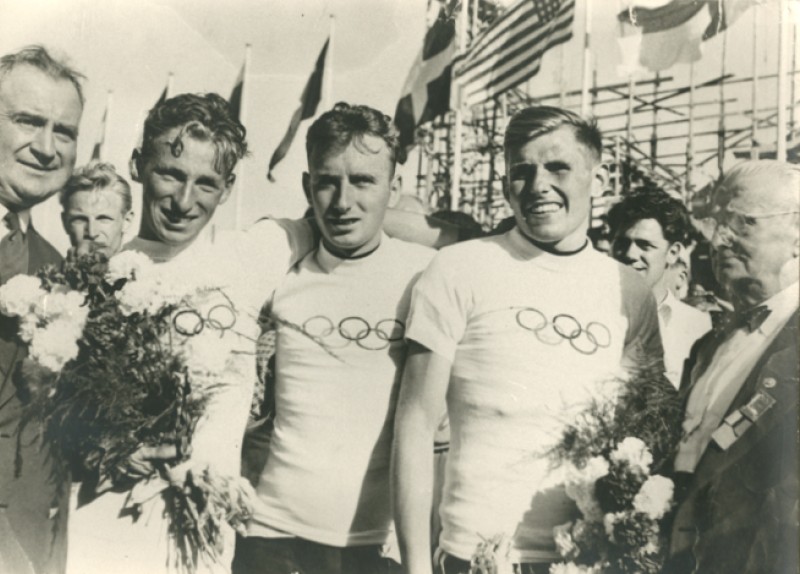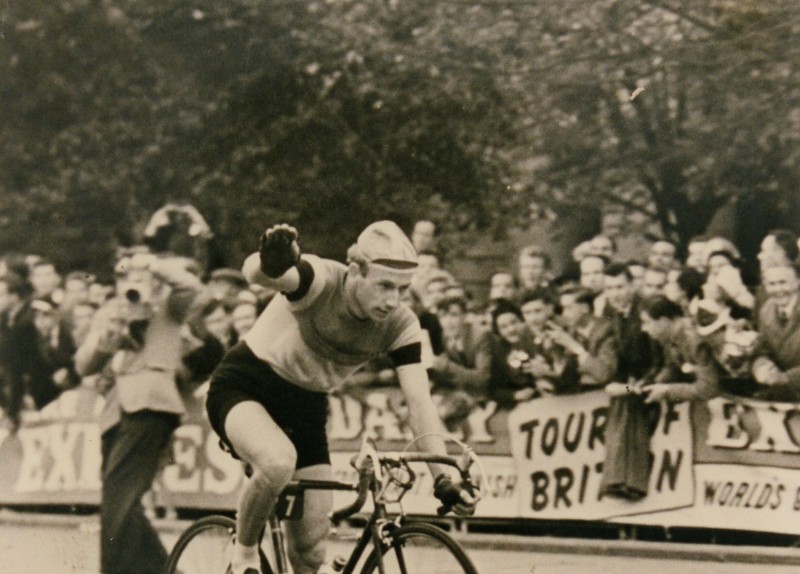The memory of Nicolas Frantz is kept alive in his former residence of Mamer (near Luxembourg City) by his grandchildren Ralph (67) and Joëlle (63) Letsch. In the stately house where the former Tour winner lived until his death in 1985 and ran a bicycle shop, siblings Letsch have set up the former studio as if it were a museum about their grandfather. Highlights in the collection include an authentic yellow jersey and the bike on which Frantz won his first Tour in 1927.
However, among the displayed memorabilia, there seem to be some that don't belong at first glance. For example, pennants from RSC Anderlecht and Standard Liège hang on the wall, and various football trophies are on display. "Those are souvenirs from our father's football past," clarify Joëlle and Ralph Letsch.
Joëlle and Ralph's father is named Léon Letsch (96). He is the husband of Nicole Frantz (92), the only child of the Tour winner. Like his father-in-law, Léon Letsch built an international top sports career. At the age of eighteen, in 1945, he broke into the first team of Spora Luxembourg, the football club from the capital where his knack for goals quickly caught the eye.
With the exception of a break from 1950 to 1953, when he played for the professional club C.O. Roubaix-Tourcoing during his studies in France, Letsch remained loyal to Spora until the end of his career in 1961. In 210 official matches, the striker made the net tremble 102 times, winning the Luxembourg title three times and the Cup twice.
Letsch also had the honor of defending the colors of the Luxembourg national team 63 times (55 times with the A team, eight times with the B team), scoring eleven goals. At the 1952 Helsinki Olympics, he contributed two goals to Luxembourg's unexpected 5-3 victory over England in the preliminary round, only to succumb to Brazil by a single goal (2-1) in the first round.
But it wasn't just soccer that occupied Léon Letsch's time. As befitting the family, he too was not immune to the cycling virus. He later became involved with Vélo-Sport Mamer, the club of his father-in-law, where he served as secretary for six years before becoming president in 1989.
In the studio of Nicolas Frantz's former residence, Joëlle and Ralph point to a framed photo on the wall, where Léon Letsch is immortalized alongside two celebrities: his father-in-law, the former Tour winner, and Josy Barthel, the Olympic champion in the 1,500-meter race from Helsinki 1952, also born in Mamer. "Three exceptional athletes from one small village, remarkable, isn't it?" Joëlle and Ralph remark.
And the family chronicle doesn't end there. Ralph Letsch, son of Léon and grandson of the Tour winner, was also a commendable top athlete. "I played handball, but you don't need to write that," he says modestly. Adding with a laugh, "By the way, I've also accumulated quite a few memories from that time that I always carry with me: a broken finger, another broken finger, yet another broken finger, one more broken finger, and a broken nose."
Prompted by his sister Joëlle, Ralph also shares the achievements he can indeed be proud of. "With my club, we played in Europe and even won European matches. We also finished second three times in the national trophy for Team of the Year in Luxembourg. I was also part of the national team."
Ralph earned his first call-up to the national handball team in 1981. In total, he would be called up thirteen times, scoring two goals.
The sporting family story could have looked even better if it hadn't been for that one page, written in jet-black ink on April 10, 1927. "Our grandfather participated in a race in Luxembourg-Pfaffenthal on that day, called Handicap du Faubourg," Ralph recounts. "He raced alongside a namesake and distant cousin, Nicolas Frantz II."
Nicolas Frantz II had won medals as a junior in national track cycling championships and had become the national champion on the road among the independents (a category between amateurs and professionals). In 1927, he had turned professional. "The plan was for him to join Alcyon that year for the Tour to help our grandfather win overall," says Ralph. "Grandpa won the Tour, but it was without Nicolas Frantz II."
Our grandfather never detailed this tragedy, but it clearly remained with him throughout his life. He was the one who had hired him and rode with him that day.
The Handicap du Faubourg involved Nicolas Frantz I and II starting together ten minutes after the other participants and trying to catch up to them. Just when they were almost succeeding, Nicolas Frantz II accidentally touched the rear wheel of his namesake. He was catapulted to the left side of the road and struck by the following car.
Despite the severe impact, the damage initially seemed minor, with 'only' superficial wounds and a broken collarbone. But appearances were deceptive. Several hours after being taken to the hospital, Nicolas Frantz II succumbed to the consequences of internal bleeding. He was only 23.
"Our grandfather never detailed this tragedy, but it clearly remained with him throughout his life," says Ralph. "Whenever the subject came up, it still affected him. He was the one who had hired him and rode with him that day. But unfortunately, the medicine at that time was not what it is today."
The Tour winner would carry his prematurely deceased namesake in his heart forever. As soon as Nicolas Frantz joined the board of Vélo-Sport Mamer after the end of his cycling career in 1934, he contributed to the organization of the Grand Prix Nicolas Frantz II in Mamer, a race initially for novices and juniors, and later, until the 1960s, for amateurs.
One of the notable names on the honors list of the Grand Prix Nicolas Frantz II - and to complete the family story entirely - is that of Paul Frantz, a cousin of the Tour winner born in 1915. Paul Frantz won the race in 1937 as a member of Vélo-Sport Mamer. The cousin of the Tour winner born in 1915 was no stranger to competition: a year earlier, he was one of the four Luxembourgers to start the Olympic road race at the Berlin Games.
In that race won by the Frenchman Robert Charpentier, only Jacques Majerus and François Neuens from the Luxembourg quartet would finish (according to the official book of the Berlin Games, respectively, as 31st and 32nd, according to other sources, ex aequo with twenty other riders in sixteenth place). Paul Frantz, on the other hand, encountered bad luck in Berlin: another rider had hit his spokes with a wing nut, ending the race prematurely for the 21-year-old Luxembourger from Mamer.
Three weeks after the Games, Paul Frantz crowned himself Luxembourg amateur champion. Two years later, in 1938, he added a silver medal to his collection at the national championship for professionals, the race in which Nicolas Frantz had remained unbeatable throughout his entire professional career (from 1923 to 1934). Paul Frantz settled for that one podium finish. The following season, in 1939, he decided to end his professional career.
Flanders is race and race is Flanders. Fortunately Ypres is also a lot of racing and a lot of riders. One of those Ypres riders is definitely...
The 1952 Summer Olympics in the Finnish capital Helsinki - held from Saturday 19 July to Sunday 3 August - threatened to turn into a sporting...










